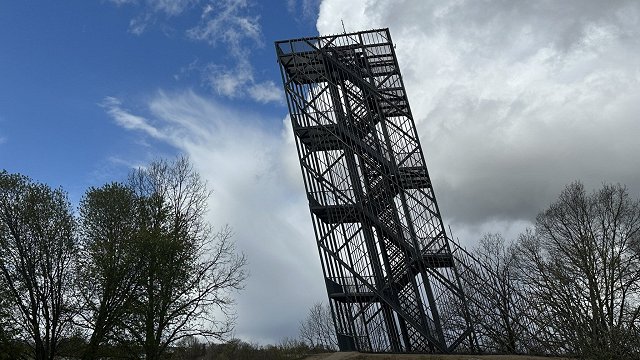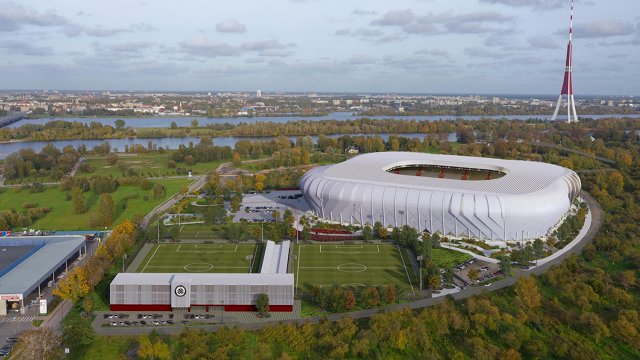Despite the fact that apartment owners can receive up to 49% of costs from the "Altum" financial institution for the renovation of buildings, and 70% of the costs of energy audit documents can be covered by municipalities, the take-up building insulation in Latvia is slow and energy bills remain high, concluded the Latvian Television program "Environmental facts" October 28.
The "Altum" program, which runs from 2022 to 2026, has 57.2 million euros available. Only 13% of this amount has been reserved so far.
Ieva Vērzemniece, head of the Energy Efficiency Program Department of "Altum", revealed that funding has been reserved for 21 apartment buildings from the currently open and available multi-apartment house program.
"We assume that next year, at the beginning of next year, we will receive a larger number of project applications," predicted Vērzemniece, adding that the support of local governments in the project preparation stage is a very important factor in order to start implementing the project.
Why hesitate on heat?
One of the problems is the rise in construction prices, as a result of which, when taking out a loan for renovation, the saved heat energy does not cover the cost of the loan. "A pensioner who suddenly has to pay 20-30 euros a month for this loan payment, he is not ready to do it for purely financial reasons," explained Ervīns Straupe, board member of the Association of Latvian House Managers and Managers (LNPAA).
Straupe admitted that it would be worthwhile to change the percentage distribution of support (currently 49%), so that, for example, fulfilling certain criteria could receive more support. The second option is to subsidize the loan interest rate.
On the other hand, Gatis Silovs, director of the Energy Financial Instruments Department of the Ministry of Economics (EM), stated that in Lithuania and Estonia one third of the house renovation costs are covered.
"Consequently, they divide this funding into smaller portions, a larger amount is received. We are currently the most generous among all three Baltic states," Silovs said. "And this is private property, and I'm sorry, but if your car needs repairs, you don't wait for the state to give you money!"
Liepāja, Valmiera and Ventspils have done best with the renovation of buildings and promotion of thermal energy. The situation in Rīga is not encouraging. For example, 3,800 houses with a total area of 7.5 million square meters are under the supervision of the "Rīga Building Manager" company (RNP), but only 45 apartment buildings with a total renovated area of 100,000 square meters have been renovated in the last three years. RNP board member Mārtiņš Paurs revealed that a goal has been set to renovate at least 50 more houses in two and a half years.
"I can cite Olaine as a good example, quite a lot of living space has been renovated there - more than half, and there, for example, the support instruments cover the interest rate in the amount of 100% of the interest payment of this loan," said Paur. "In my opinion, this is a very powerful tool. Yes, it costs the municipality dearly, but there is also a result in return."
Of course, the savings after the renovation of the building depends on what the heating tariff is, which in the last year has increased several times in many places.
Ruta Vanaga, a scientist at the Institute of Environmental Protection and Heat Systems of Riga Technical University (RTU), made calculations: "If we are currently looking at 92 kilowatt hours (kWh) and if we are looking at a 50m2 apartment, then this saving for us is about 4.6 megawatt hours (MWh) per year. Then, by multiplying these megawatt hours by the specific tariff of the supplier, we can get how many euros the specific apartment would save, and they are 460 euros per year, if the heating tariff in Riga is currently around 100 euros for 1 MWh."
So, if the estimate for building renovation works was 880 thousand euros, co-financing 49%, then 55 apartment owners have to cover the costs of 440 thousand euros. Divided by the number of apartments – 8,000 euros each. (Of course, it depends on the area of each apartment.) If you can save 460 euros a year on heat energy, then the payback time is almost 17.5 years.
As Vanaga points out, in most cases before insulation is fitted, it is necessary to perform defect elimination works related to cracks, crumbled bricks, damaged rain gutters and damp. "Actually, these works do not increase energy efficiency or increase it very little, but... by adding this insulation, we see that [there is] a shorter payback period."
Sooner or later all these apartment blocks will have to be renovated – if not, they may become uninhabitable, but often the most important thing for residents is that loan repayments do not make the monthly payments more expensive, that is, the saved heat energy must exceed the loan costs. Research shows that after building renovation works, the real estate value increases by 10-30%.
What should the residents start with ?
To start a renovation, first of all, the residents of the house must agree that they want to renovate the building. "In order to start the renovation of the building, two documents must be created – the technical opinion of the building and the energy audit," said Lelītis. "These two documents will combine the information we have with the current state of the building and outline the perspective of what we could achieve, what we could save."
The development of these first two documents for a five-story house alone could cost around 2,500 euros, though 70% can be returned. Once this is done, you need to apply for a grant program, start developing a construction project, for which support is also provided, and then the road leads to the bank.
The energy efficiency specialist emphasized that it is very important to pay attention to these basic documents. The better the construction project is developed, the easier it is for the builder to create an accurate estimate so that it does not become expensive later.
"What needs to be mentioned is that apartment owners must be good utility payers," admitted Lelītis. "Inhabitants do not have to pledge anything, no credit obligations as such are made on the person."




























